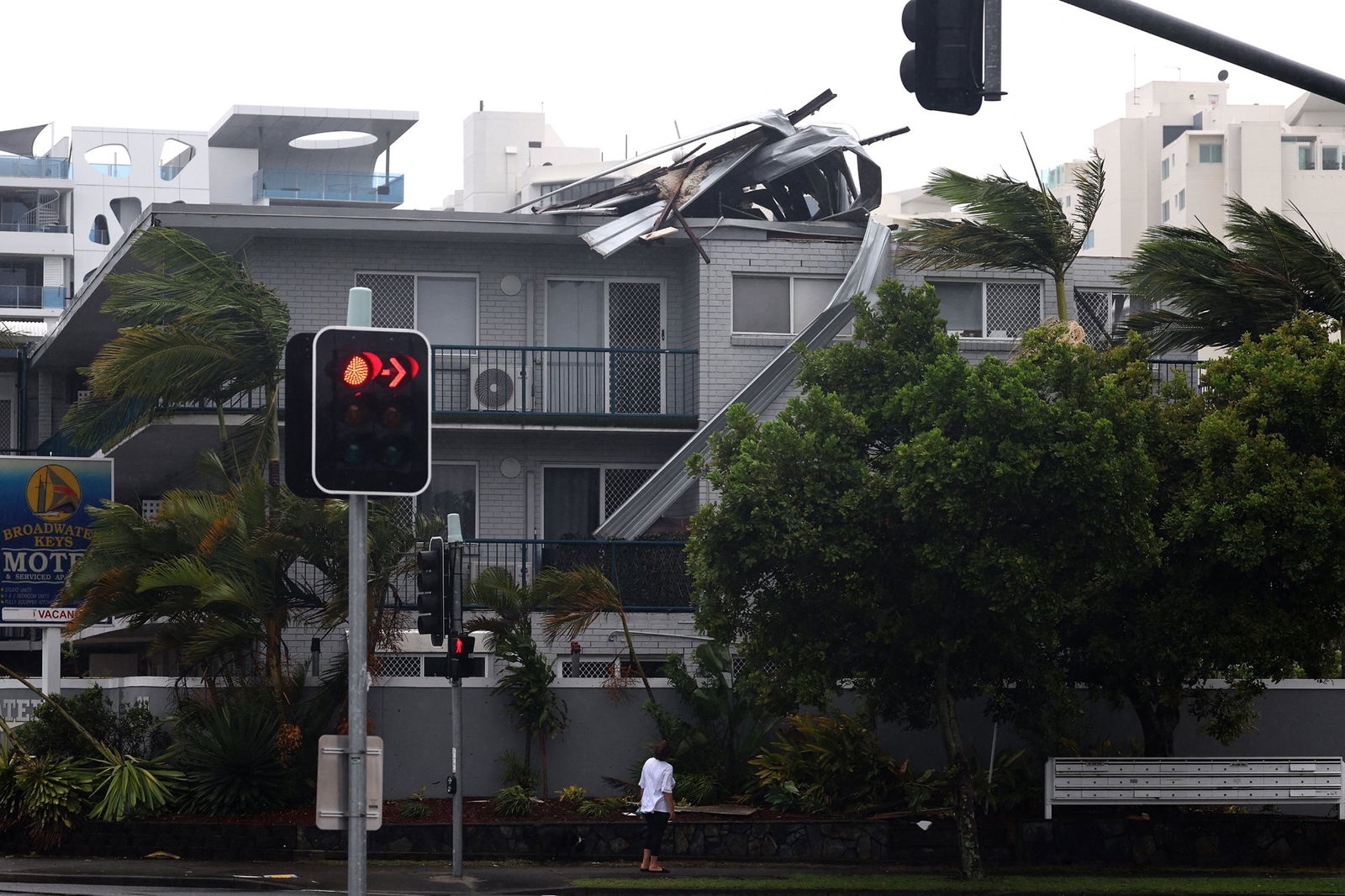Violent winds have toppled power lines as a tropical cyclone inched towards Australia’s eastern coast, swelling rivers, sparking evacuation orders and leaving 250,000 people without electricity.
Tropical Cyclone Alfred is crawling towards the densely populated coastline at “walking speed”, government forecasts said earlier.
On the Gold Coast, several people have been rescued from the beaches, despite them being closed by officials.
“[It’s] just stupidity, people are trying to get on the beach -trying a cheap thrill... they’re putting themselves in danger,” President of Mermaid Beach Surf Life Saving Club Paul Mann told the ABC.
Some four million people were in the firing line along a 400km stretch of coastline straddling the state border of Queensland and New South Wales.
It is a region rarely troubled by typhoons - it has been more than 50 years since a tropical cyclone made landfall in that stretch of coast.
STORY CONTINUES AFTER LIVEBLOG
KEY POINTS
- Strong winds and heavy rain are lashing parts of Australia’s eastern coastline on Saturday morning.
- Areas currently impacted are the northern parts of New South Wales and the Queensland coast, including the Gold Coast, Brisbane and Moreton Bay.
- Are you a Kiwi in Australia bracing for Cyclone Alfred? Contact us via [email protected].
- 'Stupidity': Several people rescued from Gold Coast beaches
Despite the threat of $16,000 fines, some people are still accessing closed beaches on the Gold Coast. Several people have had to be rescued from areas recording 10-metre swells, despite the beaches being closed.
"[It's] just stupidity, people are trying to get on the beach -trying a cheap thrill... they're putting themselves in danger,” President of Mermaid Beach Surf Life Saving Club Paul Mann told the ABC.
“Some people got dragged out today - first responders had to go and save them - like you're putting other people's lives at risk. Why?"
03:29 pm
'Possible that it will reach the levee and then go over the top'
Rains pose a threat to engorged rivers across the region, bureau meteorologist Daniel Hayes told AFP, with some rivers approaching major flood levels.
In Lismore - a northern New South Wales city hit by deadly floods in 2022 - the Wilsons River might threaten a 10.6-metre (35-foot) protective levee, he said.
"It is still quite possible that it will reach the levee and then go over the top," he said.
Emergency services warned of a serious impact if that happens.
"We're literally talking about a failure in the levee and a significant rush of water," the state's emergency services chief, Michael Wassing, told reporters.
Evacuation orders have been issued for 16,200 people in New South Wales, emergency services said.
A "staggering" number of more than 239,000 properties in southeast Queensland were without power on Saturday morning after winds toppled power lines or blew trees and debris into them, utility group Energex said.
It was too dangerous for crews to work in some blacked-out areas, Energex Brisbane area manager Chris Graham told national broadcaster ABC.
Another 39,000 homes and businesses were without power in northern New South Wales, regional provider Essential Energy said, warning that floods could hamper repair operations.
- AFP
03:26 pm
Man still missing after being swept into raging river
One man was still missing after his four-wheel drive vehicle was swept off a bridge into a rain-swollen river yesterday in northern New South Wales.
He clambered out of the vehicle and tried in vain to cling to a branch in the river.
"The man was swept from the tree and seen to go beneath the water where he has not been sighted since," police said in a statement.
Prime Minister Anthony Albanese said there were "grave concerns" for the man.
"While it [the cyclone] has been downgraded, very serious risks remain so it is important that people do not take this downgrading as a reason for complacency," Albanese told a news conference.
"Its impact will be serious and will intensify over coming hours and indeed over coming days."
- AFP
![A woman surveys the damage to the roof of a motel caused by strong winds in Labrador, near the Gold Coast.]()
03:23 pm
Fears of major floods, more than 250,000 homes without power
Cyclone Alfred weakened into a tropical low on Saturday but still threatened to unleash major floods on swollen rivers as it approached the rain and wind-lashed eastern coast of Australia.
The former tropical cyclone has blacked out more than a quarter of a million homes and businesses while prompting evacuation orders for thousands of people.
Though now deprived of gale-force winds, the tropical storm was slowly moving towards the coast and delivering intense rain before crossing over the mainland.
"Despite its weakening, heavy rainfall is likely to continue over southeast Queensland and northeast New South Wales during the weekend," the bureau of meteorology said.
The rains could still lead to "dangerous and life-threatening" flash flooding along the 400-kilometre stretch of coastline straddling the two states, it said.
- AFP
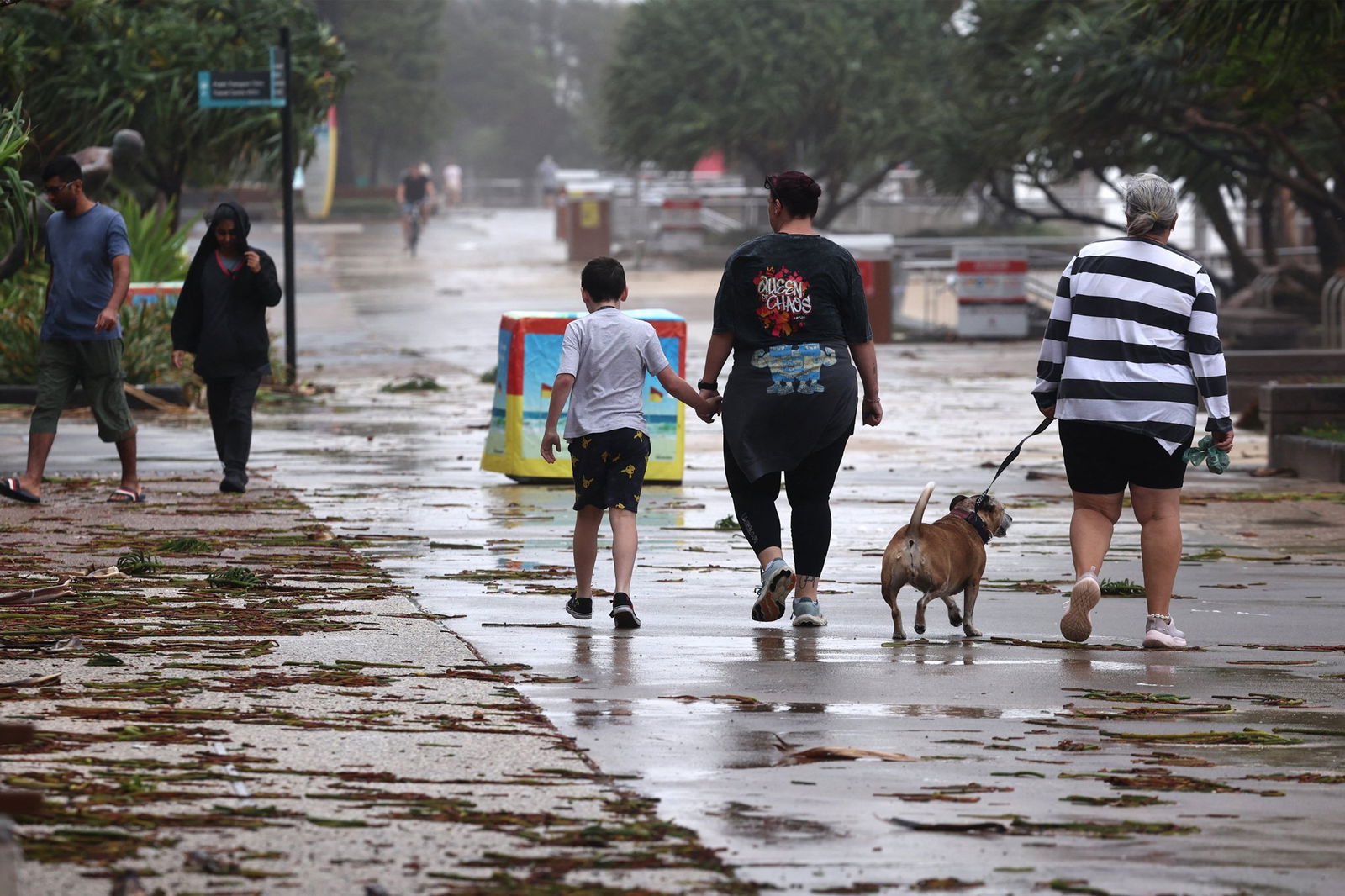
03:16 pm
03:15 pm
02:38 pm
02:34 pm
02:33 pm
12:42 pm
Lulu Wood, a New Zealander holidaying in Gold Coast, has shared photos of the storm hitting Surfers Paradise. 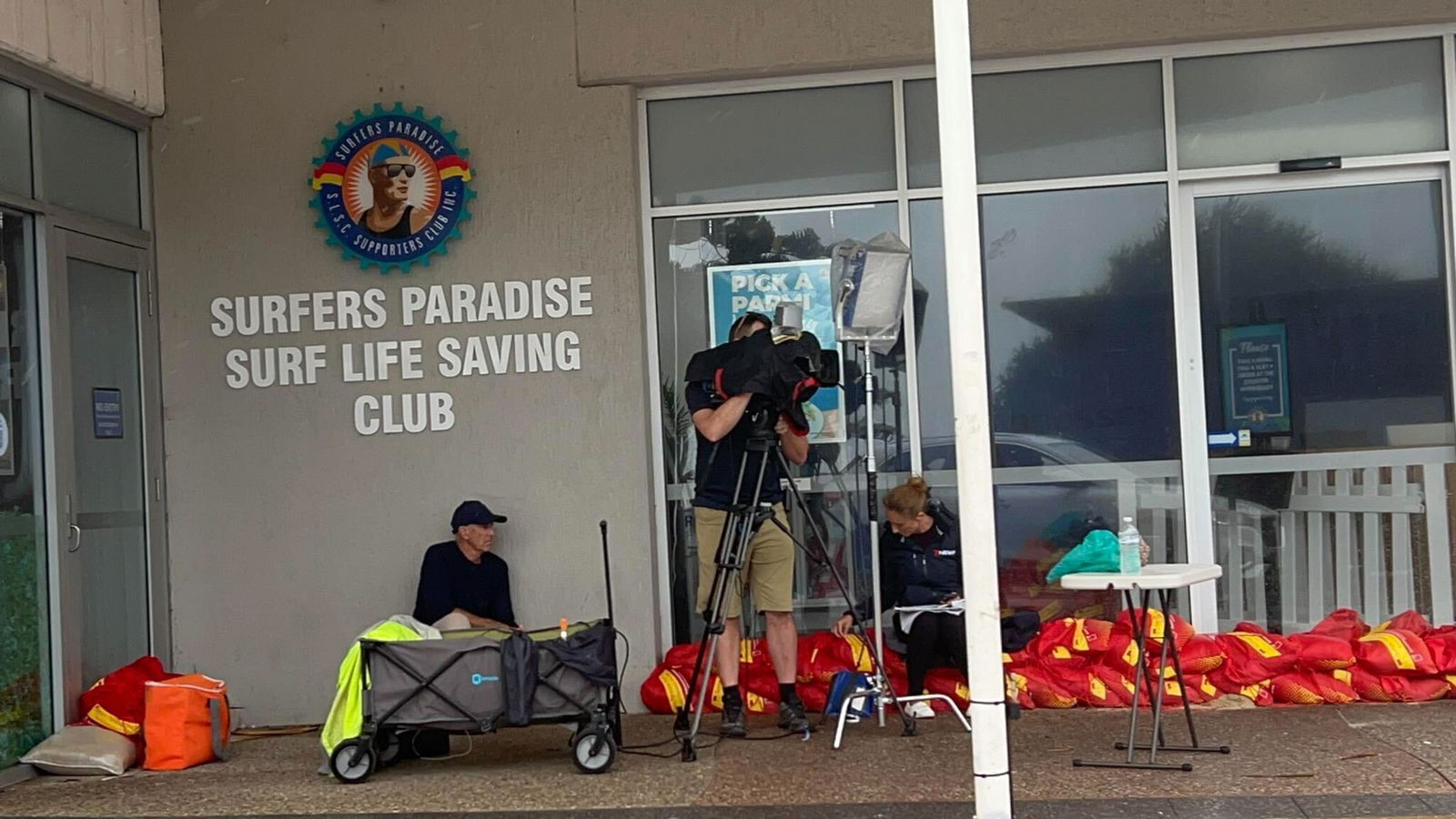
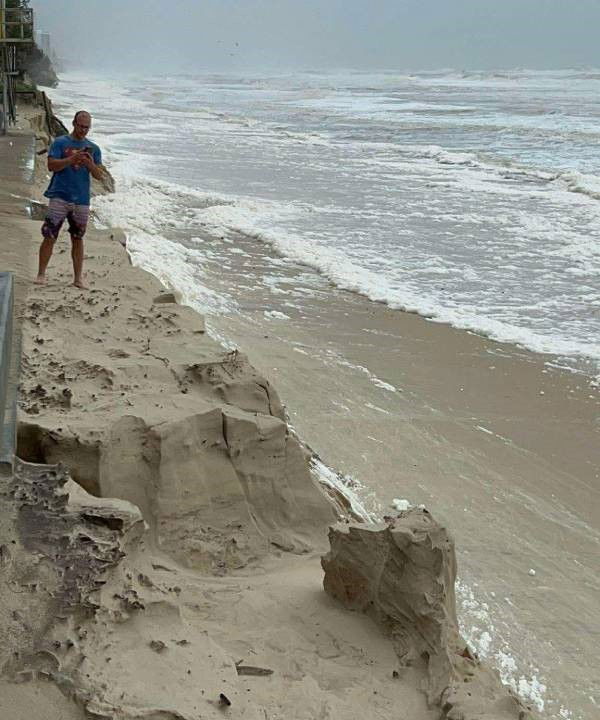
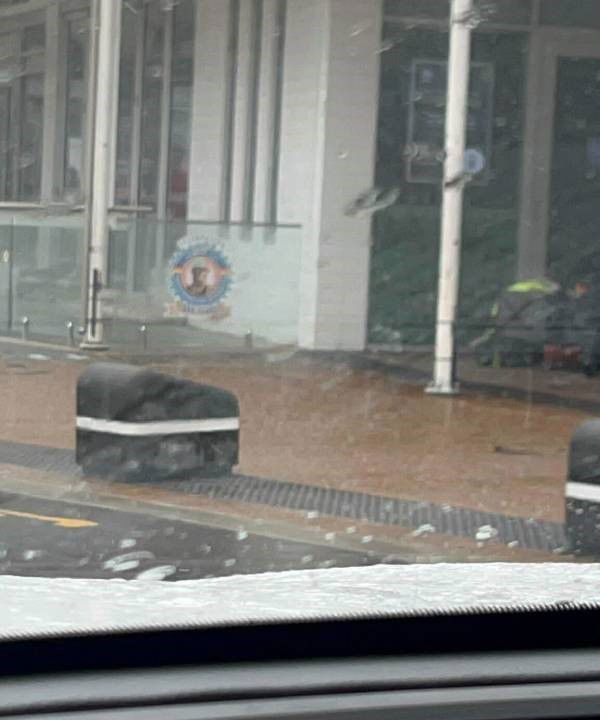
12:21 pm
Australian PM: Storm's impact 'will intensify over coming hours'
Albanese also said despite the storm being downgraded, its impact both physically and mentally would be lasting for some.
“Its impact will be serious and will intensify over coming hours and indeed over coming days, it will still bring strong winds, heavy rain, flooding and dangerous conditions across South East Queensland and North East, New South Wales over this weekend and in the days beyond,” he said.
“Some of these communities have copped it time and time again, and that just makes it so tough for people who’ve rebuilt and recovered and who then find another wave of trauma heading their way along with the cyclone."
12:15 pm
Albanese rules out election being called on Sunday or Monday
12:13 pm
Australian PM on activating disaster payments
Australian PM Anthony Albanese says the federal government would come to the help of those impacted by the weather system. That included activating disaster payments to those who need them, via the Australian Government Disaster Recovery Payment.
People are eligible for $1,000 per adult and $400 per child as a one of payment for immediate assistance.
"The Disaster Recovery Allowance is a payment for up to 13 weeks for people who are unable to work as a direct result of the disaster," he said.
"There are also jointly funded payments between the Commonwealth and the states, so they are activated by the states.
"There is a personal hardship assistance scheme — states can choose to activate these payments which cover immediate personal costs like replacing food, medical supplies, clothing, and essential household items like bed linen and whitegoods."
10:07 am
Cyclone Alfred is currently 65km north-east of Brisbane and 49km south-east of Maroochydore.
10:06 am
Brisbane mayor: 'Not out of the woods yet'
Brisbane mayor says the city has “dodged a bullet” due to the downgrading, and the path of the ex-tropical cylone.
But he said the city wasn't "out of the woods yet".
“What we’re worried about now, and what we must be concerned about, is how much rain comes next, and this is a challenge that Brisbane faces,” Adrian Schrinner said on ABC Radio Brisbane.
“Rainfall [that is] intense over a number of hours can cause flash flooding, and so we’re not out of the woods yet.”
10:05 am
Despite downgrade: Alfred can still cause mayhem
Queensland Premier David Crisafulli said despite the downgrading of the warning level, the weather system could still cause mayhem.
“We’ve seen some trees fall, and we’ve seen one apartment building quite badly damaged,” he said.
“Obviously power remains a really big issue at the moment with nearly a quarter of a million homes without power.
“The good news overnight is that the risk of storm tide inundation has passed.”
09:40 am
Cyclone Alfred downgraded to a tropical low
Cyclone Alfred has been downgraded to a tropical low and is now referred to as "Ex-Tropical Cyclone Alfred".
09:06 am
Cyclone Alfred approaches mainland
Cyclone Alfred is currently 65km north-east of Brisbane and 45km south-east of Maroochydore, moving at 8km/h towards the mainland coast.
08:47 am
'Risk to life': Brisbane residents warned of what to come
Although the speed at which the cyclone is travelling has slowed, Brisbane locals have been sent a stark warning of what might be to come.
A new alert sent by Brisbane City Council has warned of the winds and how dangerous they could be.
“You will hear things breaking outside and hitting your house,” the alert read.
The alert also warned of how dangerous it could be outside, including around trees, powerlines and other objects which could be thrown through the air.
"This is a risk to life.”
08:34 am
Risk of flash flooding
Rosa Hoff from the Bureau of Meteorology has told the ABCabout the weather system having the potential to cause flash flooding.
"The rain will not go anywhere in a hurry, so again it will keep raining into the weekend, even if we see the centre of the system cross as forecast in the late morning period," she says.
"So we're talking days of that rainfall and that spreading further inland as well."
08:32 am
Update from NSW State Emergency
Around 40,000 in northern NSW are without power, according to an update by officials from the NSW State Emergency.
They have responded to 1500 call outs since Friday night.
07:17 am
'Stupidity': Several people rescued from Gold Coast beaches
Despite the threat of $16,000 fines, some people are still accessing closed beaches on the Gold Coast. Several people have had to be rescued from areas recording 10-metre swells, despite the beaches being closed.
"[It's] just stupidity, people are trying to get on the beach -trying a cheap thrill... they're putting themselves in danger,” President of Mermaid Beach Surf Life Saving Club Paul Mann told the ABC.
“Some people got dragged out today - first responders had to go and save them - like you're putting other people's lives at risk. Why?"
07:13 am
'Prepare to evacuate'
The New South Wales State Emergency Service (NSW SES) advises people to prepare to evacuate due to major flooding in some parts of NSW.
07:11 am
Warning: Shelter now
The New South Wales State Emergency Service (NSW SES) advises people to shelter now.
07:09 am
Warning: Stay indoors
The New South Wales State Emergency Service (NSW SES) advises people to stay indoors, unless they have been directed to evacuate due to expected flooding.
06:55 am
More than 250,000 people without power
On the Gold Coast, beaches have been closed by officials. People who breach the closure face fines of up to $16,000.
Power outages are currently impacting more than 250,000 people. Energy providers have warned that the number is likely to grow considerably once the cyclone fully crosses mainland coastal areas.
Weather forecasters in Australia say the cyclone is moving at about 10kph. It is generating average winds of 75kph with gusts topping 100kph.
Flood warnings to residents in northern New South Wales show how dangerous Cyclone Alfred could turn out to be. The alerts sent this morning said: "Seek shelter in a sturdy raised structure that can be safely accessed."
"You may now be trapped without power, water, and other essential services and it may be too dangerous for NSW SES to rescue you."
06:46 am
Strong winds, heavy rain lashing as Brisbane locals told to stay away from windows
Strong winds, sea surges on coastal areas and heavy rain are lashing parts of Australia’s eastern coastline this morning as Tropical Cyclone Alfred makes its impact.
Areas currently being impacted are northern parts of New South Wales, then up the Queensland coast including the Gold Coast, Brisbane and Moreton Bay.
"Go to the strongest, safest part of the building you are in. This will be away from big windows," Brisbane locals have been told by city officials.
"It could be a bathroom, walk-in wardrobe, or hallway. Stay there."
06:14 am
06:13 am
No deaths have been reported, but police said one man was missing after his four-wheel drive vehicle was swept from a bridge into fast-running river water south of the cyclone.
“The male driver was able to exit the vehicle and secure himself to a tree branch,” New South Wales police said in a statement.
But later, “the man was swept from the tree and seen to go beneath the water where he has not been sighted since.”
Heavy rains associated with the cyclone had already prompted flood warnings in the area.
 A damaged yacht that was swept away by the waves rests at Point Danger on the southern end of the Gold Coast. Photo / AFP
A damaged yacht that was swept away by the waves rests at Point Danger on the southern end of the Gold Coast. Photo / AFP
Packing a ‘punch’
On Friday evening, around 80,000 homes were left in the dark across the two states as winds uprooted trees and brought down power lines, officials and utility companies said, as repair crews raced to restore electricity.
Queensland Premier David Crisafulli said the storm already “packed a punch”, warning conditions would get worse as it approached land on Saturday morning.
AFP images showed a white yacht blown into the rocks after snapping its moorings at Point Danger on the Gold Coast.
Two people made “a lucky escape” after a large gum tree crashed through the roof of a house in rural Currumbin Valley, the Queensland Ambulance Service said.
Emergency response officials said they had issued evacuation orders for some 10,000 people in the flood-prone northern rivers region of New South Wales.
There was particular concern for the town of Lismore, which was engulfed by record 14m floodwaters after heavy rains in 2022.
Many residents have spent the past three days fortifying their homes with sandbags, tying down loose furniture and stocking up on food and water.
“A lot of people are feeling a bit anxious, for sure, because we don’t know what’s going to happen,” said Paul Farrow from Coolangatta, a coastal suburb better known for its sun-splashed beaches.
“Yeah, we could all lose our houses. Who knows,” the 62-year-old told AFP.
“The pubs might be shut for a week or two. Who knows.”
Farrow said he had stashed a “couple of peaches”, a “couple of cartons of beer”, and “a bag of grapes” to get him through.
“So I’ll be right,” he said.
 A police boat looks for a jet ski rider who went missing amid record-breaking waves. Photo / AFP
A police boat looks for a jet ski rider who went missing amid record-breaking waves. Photo / AFP
Destructive winds, high tides
Prime Minister Anthony Albanese said the region should “hope for the best, but prepare for the worst”.
“When nature does its worst, Australians are at our best. We rally. We lift each other up. We look out for our neighbours,” he told reporters.
Tropical Cyclone Alfred would likely cross the coast on Saturday, the Bureau of Meteorology said, although its path has proven increasingly difficult to track.
It was forecast to make landfall somewhere north of Brisbane.
Drenching rains, “destructive” wind gusts, and “abnormally high tides” would pummel the coast as it crept nearer, the bureau said.
More than 900 schools across Queensland state and neighbouring parts of northern New South Wales were closed on Friday, education department officials said.
While cyclones are common in the warm tropical waters lapping Australia’s northern flank, it is rarer for them to form in cooler waters further south.
Alfred would be the first to make landfall in that part of Australia since 1974, the Bureau of Meteorology said.
Researchers have repeatedly warned that climate change amplifies the risk of natural disasters such as bushfires, floods and cyclones.
Take your Radio, Podcasts and Music with you

